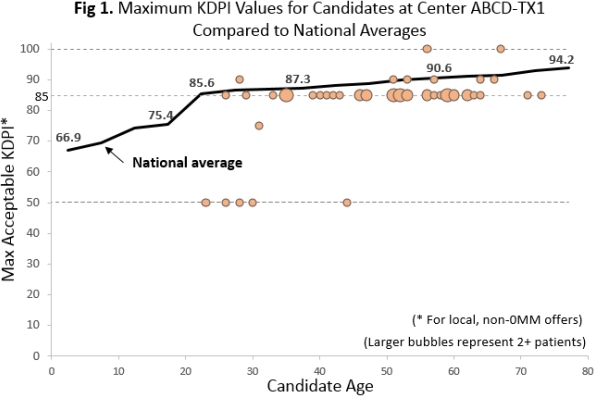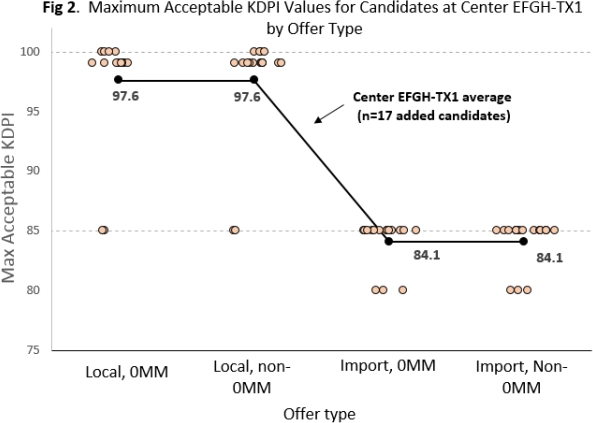Emerging Strategies to Screen Kidney Offers Based on the Kidney Donor Profile Index (KDPI)
1UNOS, Richmond, VA
2Florida Hosp, Orlando, FL
3Translife, Orlando, FL
4Univ Hosp Case Med Ctr, Cleveland, OH
5Yale Univ, New Haven, CT.
Meeting: 2015 American Transplant Congress
Abstract number: C42
Keywords: Allocation, Donors, Kidney transplantation, marginal, Screening
Session Information
Session Name: Poster Session C: ECD/DCD/high KDPI
Session Type: Poster Session
Date: Monday, May 4, 2015
Session Time: 5:30pm-6:30pm
 Presentation Time: 5:30pm-6:30pm
Presentation Time: 5:30pm-6:30pm
Location: Exhibit Hall E
Background: In the Organ Procurement and Transplantation Network's (OPTN) new kidney allocation system, kidney offers are screened by setting for each candidate a maximum acceptable KDPI (mKDPI), which can vary by offer type: (local, import) and (0MM, non-0MM). Patients must consent to receive KDPI>85 offers.
Methods: mKDPI values were examined for the 142 kidney programs that added 5 or more candidates to the waitlist from 5/27/14-10/31/14 (n=9,772 registrations). Kidney offer acceptance rates were explored. Analyses were based on OPTN data as of 11/14/14.
Results: The most common mKDPI values for local, non-0MM offers were 85 (61%) and 100 (25%). While 32 (23%) of 142 programs entered the same mKDPI value for each of their patients, some programs (e.g., ABCD-TX1, Fig 1) appear to have stratified mKDPI values based on clinical factors such as candidate age. Nationally, average mKDPI increased from 67 for pediatrics age <5 to 94 for age 76+. Some pediatrics were given mKDPI values of 20 or 35. Only 13 programs set mKDPI higher for local vs imports. Fig 2 highlights one such center (EFGH-TX1), which set most patients' mKDPI to 100% for local and 85% for non-local offers, consistent with its history of accepting 0 of 20 non-local, KDPI>85 kidneys offered since 2007. 10 programs set higher mKDPI for 0MM vs non-0MM.
Only 13 programs set mKDPI higher for local vs imports. Fig 2 highlights one such center (EFGH-TX1), which set most patients' mKDPI to 100% for local and 85% for non-local offers, consistent with its history of accepting 0 of 20 non-local, KDPI>85 kidneys offered since 2007. 10 programs set higher mKDPI for 0MM vs non-0MM.
Conclusions: Some centers appear to have deliberate strategies for setting mKDPI based on factors such as patient age and offer type. Programs that will continue to refuse imported, high-KDPI kidneys may benefit by setting lower mKDPI values for non-local offers. Effective use of this new screening tool can avoid unwanted offers, accelerate organ placement, and reduce kidney discard rates.
To cite this abstract in AMA style:
Stewart D, Kucheryavaya A, Boyle G, Metzger R, Aeder M, Formica R. Emerging Strategies to Screen Kidney Offers Based on the Kidney Donor Profile Index (KDPI) [abstract]. Am J Transplant. 2015; 15 (suppl 3). https://atcmeetingabstracts.com/abstract/emerging-strategies-to-screen-kidney-offers-based-on-the-kidney-donor-profile-index-kdpi/. Accessed February 18, 2026.« Back to 2015 American Transplant Congress
